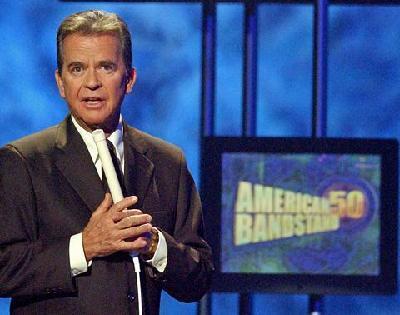當(dāng)前位置: Language Tips> VOA聽(tīng)力> Normal Speed News VOA常速
分享到
Dick Clark, entertainment pioneer and television host of American Bandstand, has died at age 82. Publicist Paul Shefrin said Clark suffered a heart attack Wednesday and died at St. John's Health Center in Santa Monica, California.

He was not a singer or musician, but Dick Clark was one of the most famous names in rock and roll. In the 1950s and '60s his afternoon television show, American Bandstand, was a daily staple for teens across the country and it changed the way Americans listened to pop music.
Born in Mount Vernon, outside of New York City, Clark hit the airwaves before he was even out of high school. His career began in the mailroom of a radio station run by his father and his uncle. Before long, he was on the air. He continued to work as a disc jockey through college, and returned to the small, family run station after graduation. One year later, in 1952, he hit the "big time," moving to WFIL in Philadelphia, Pennsylvania and soon was one of the best known radio DJ's in town. At that time, WFIL also owned a television station that had an afternoon teen dance show called "Bandstand," and in a few years Mr. Clark became the regular host of that program, too.
In 1957, the ABC television network decided to take "Bandstand" national, after Clark convinced them that a teen dance show would be popular all across the country.
"I was a very young fellow," noted Clark. "That show was getting huge audiences in Philadelphia. Sixty-five percent of the people watched Bandstand when it was in Philadelphia. It wiped out all the competition. I said 'It doesn't matter. It isn't just Philadelphia, this is a universal language. It will work everywhere. Trust us, it will work. Give us five weeks.' And in August of 1957, they did, and, as they say, the rest is history."
Renamed American Bandstand, the show became one of TV's longest running series and was a part of network's lineup from 1957 to 1987.
Everyone who was anyone in the pop music business performed on Bandstand, from Jerry Lee Lewis and the Jackson Five to Prince and the Talking Heads. Paul Anka launched his career on American Bandstand in 1957 with the song "Diana."
"I think Dick has been very massive, in that he was the first and one-of-a kind who allowed all of us that conduit [pipeline] to the public," Anka said. "Who not only was a very viable force then, but stayed very contemporary through all of these years and uniquely kept everything that he was about very special."
His initial television success led Dick Clark to diversify. He soon moved into the music publishing and record business, which the US government later saw as a possible conflict of interest. At the time, payola, or bribery, was widespread in the music industry, with record companies paying DJ's to play their records. Clark was a prime target of a Congressional investigation into this illegal activity. He was cleared of any suspicions, but was required by ABC to sell his publishing and recording companies in order to keep his television show.
Clark moved to Hollywood in 1963, and "American Bandstand" went with him. Soon, he started up Dick Clark Productions and was cranking out hit television programs. Some of the shows were music related, but many were game shows and award shows. He was also an author, leading some to wonder if Clark was a workaholic.
"People say 'Why do you work so hard? You made enough money to retire on when you were a kid!' And I say, everybody should be this lucky to live out the fantasy of their youth," Clark said. "I wanted to be in the radio business when I was 13. I started working on it when I was 17, and I don't want to stop."
In 1972, Clark became synonymous with one of the biggest party nights of the year, when he launched Dick Clark's New Year's Rockin' Eve and watching the show every December 31 was soon a yearly tradition for millions and millions of Americans. Clark continued to host the show until 2004, when he suffered a stroke that left him partially paralyzed and struggling to speak. But a year later, Dick Clark was back and even though his speech was, at times, still difficult to understand, many praised his bravery, including other stroke victims.
Dick Clark earned countless awards and honors during his long career: he has Emmys, Grammys, a star on the Hollywood Walk of Fame and is in the Rock And Roll Hall of Fame.
Dick Clark was often teased for his eternally good looks, which earned him the nickname "America's Oldest Teenager." He always credited his youthful appearance to good genes, and was quoted as saying "If you want to stay young looking, pick your parents very carefully."
payola: bribery of an influential person in exchange for the promotion of a product or service, such that of disc jockeys for the promotion of records 賄賂
New Year celebrations around the world
From Bhangra to Reggae, a musical trip around the world
Pop icon's death, new star's unexpected success in 2009
Hip-Hop goes global to a socially active beat
(來(lái)源:VOA 編輯:旭燕)
分享到
關(guān)注和訂閱


口語(yǔ)
關(guān)于我們 | 聯(lián)系方式 | 招聘信息
電話:8610-84883645
傳真:8610-84883500
Email: languagetips@chinadaily.com.cn